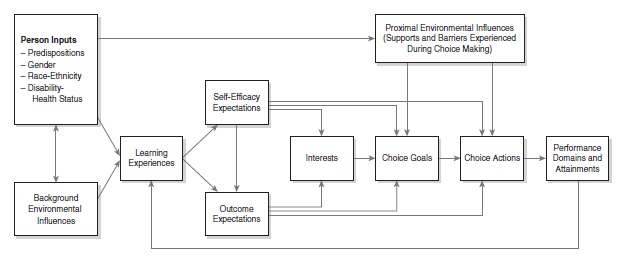Self-Affirmation Theory
Self-Affirmation Theory Definition The self-affirmation theory posits that people have a fundamental motivation to maintain self-integrity, a perception of themselves...
Read More
After-School Programs
After-school programs (ASPs) are those programs available to children 6 to 18 years of age that are characterized by structure,...
Read More
Self-Categorization Theory
Self-categorization theory addresses the problem of the psychological group. Are there such things as psychological groups? How do they form?...
Read More
Age Discrimination
Robert Butler is credited with originating the term ageism in 1968. Ageism involves negative attitudes and discriminatory practices against individuals...
Read More
Self-Determination Theory
The self-determination theory (SDT), formulated by Edward L. Deci and Richard M. Ryan, is a broad theory of human motivation...
Read More
Self-Discrepancy Theory
Self-discrepancy theory was developed in an attempt to answer the following question: Why is it that when people are emotionally...
Read More
Aggression and Adult Development
Aggressive behavior often poses problems in humans across the life span, both as initiators and recipients of aggression. The study...
Read More
Self-Expansion Theory
Self-Expansion Theory Definition Close relationships open up new worlds to people. As you interact with roommates, close friends, and relationship...
Read More
Aging and Develomental Psychology
Aging is inevitable. Although the average life expectancy has increased dramatically in recent years, we have yet to discover the...
Read More
Self-Perception Theory
In everyday life, people observe other people’s actions and behaviors and make inferences about others’ attitudes based on what they...
Read More
Aging Parents
Throughout our life span, the family is one of the most stable and reliable relationships we experience. Aging parents in...
Read More
Self-Verification Theory
The self-verification theory proposes that people want others to see them as they see themselves. For example, just as those...
Read More
Aging Well
Most adults want to live long, in good health, and with an overall sense of well-being. Aging well describes this...
Read More
Sexual Economics Theory
Sexual Economics Theory Definition Sexual economics theory is an idea about how men and women think, feel, respond, and behave...
Read More
Mary Salter Ainsworth
Mary Dinsmore Salter was born on December 1, 1913, in Glendale, Ohio, but grew up in Toronto, Canada. As a...
Read More
Sexual Strategies Theory
Sexual Strategies Theory Definition Strategies are the means people use to achieve goals. If the goal is to obtain food,...
Read More
Social Exchange Theory
Social Exchange Theory Definition Social exchange theory is a broad social psychological perspective that attempts to explain how human social...
Read More
Social Identity Theory
Social Identity Theory Definition and History Social identity theory explains how the self-concept is associated with group membership and group...
Read More
Job Sharing
Job sharing, sometimes called work sharing, generally refers to the practice of having two or more people share a single...
Read More
Life/Career
The traditional view of career, what one does on the job at work and the sequence of work-related positions throughout...
Read More
Narrative Career Counseling
Narrative career counseling represents a shift from the 20th-century focus on objective interventions for career decision making toward a 21st-century...
Read More
Occupational Information
Occupational information is one of the major components needed to make effective career decisions. Occupational information refers to the collection...
Read More
Occupational Information Network
The Occupational Information Network (O*NET) is the United States Department of Labor’s online successor to the Dictionary of Occupation Titles...
Read More
Part-Time Work
Part-time work refers to work performed by laborers who work less than the standard number of hours and who are...
Read More
Pay Equity
Pay equity is based on the principle that the payment an employee receives from the employer should be proportional to...
Read More
Personal and Career Counseling
Personal counseling and career counseling share a significant history. Vocational or career counseling started with the work of Frank Parsons...
Read More
Private Practice Career Counseling
Career counselors working in private practices typically provide services to individual and organizational clients. The services most often rendered to...
Read More
Process and Outcome Research
Process and outcome research are two interconnected research methodologies that identify the processes that go on in counseling sessions and...
Read More
Roe’s Career Theory
Anne Roe (1904—1991) was born and raised in Denver, Colorado. Upon graduating from the University of Denver, she attended Columbia...
Read More
Social Cognitive Career Theory
Social cognitive career theory (SCCT) seeks to explain three interrelated aspects of career development: (1) how basic academic and career...
Read More
Spirituality and Career Development
Career counseling is a dynamic process of helping clients explore how aspects of their identity may relate to their career...
Read More
Training in Organizations
Training refers to activities designed to facilitate the acquisition of knowledge, skills, and attitudes relevant to performance in an occupation....
Read More
Work-Bound Youth
The majority of youth enter the world of work prior to receiving postsecondary education or training. By age 26, 85%...
Read More
Work-Family Balance
Balancing the demands and domains of work and family life presents major challenges for individuals, couples, and families. Career counselors...
Read More
Work Stress
Work now more than ever consumes large portions of people’s lives. The importance of work in people’s lives, alongside the...
Read More
Work Values
It is generally accepted that there are three or four things that contribute to success and satisfaction at work or...
Read More
Civil Rights
Civil rights have been generally defined as affirmative legal promises governments make to protect the privileges and power of a...
Read More
Confidentiality and Legal Privilege
Confidentiality is the legal and ethical duty of therapists not to reveal information about their clients to unauthorized individuals. Legally...
Read More
Code of Ethics and Standards of Practice
At the heart of the counseling profession is the all-important relationship between the professional counselor and the individual, couple, group,...
Read More
Custody Evaluation
A child custody evaluation, also known as a parental responsibility evaluation, is a process by which recommendations are made to...
Read More
Ethical Codes
Ethical issues are often complicated and multifaceted and can be challenging for counselors if they attempt to create simple solutions...
Read More
Ethical Dilemmas
Counselors make hundreds of decisions as they work with clients. They use professional skills and knowledge to gather information in...
Read More
Ethics in Computer-Aided Counseling
Technology in counseling began with the advent of the desktop computer over 30 years ago. Success in computer-aided services for...
Read More
Ethics in Research
Ethical issues in social science research are of crucial importance not only to the individuals involved, but also to society....
Read More
Individuals with Disabilities Education Act
The Individuals with Disabilities Education Act (IDEA) is a federal law that ensures that all children ages birth through 21...
Read More
Informed Consent
Informed consent in counseling and psychotherapy refers to the process by which clients or prospective clients receive information about the...
Read More
Legal Issues in Parenting
The legal issues regarding parenting can be, and often are, highly complicated and controversial issues, needing to be addressed within...
Read More
Oppression
The concept of oppression has been written about by scholars and educators in various fields. Oppression has been defined as...
Read More











